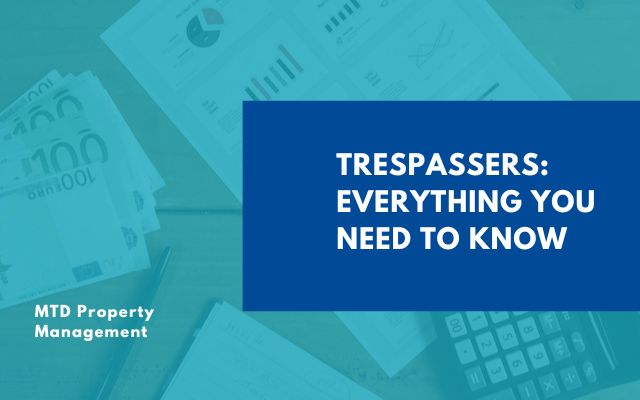
Are you a landlord navigating the tricky waters of managing trespassers on your property? Understanding how to deal with unauthorized visitors is crucial for maintaining the safety and security of your premises.
In this comprehensive guide, we delve into everything you need to know about trespassers, from identifying them to legally safeguarding your property. Whether it's a one-off incident or a recurring challenge, we'll arm you with the knowledge and strategies to address trespassing effectively and maintain a peaceful, secure environment for your tenants. You can handle it yourself or hire property management to do it for you.
Join us as we explore practical tips and legal insights tailored specifically for full-time or part-time landlords. Keep reading this article to learn more!
What Does Trespassing Mean?
Trespassing generally refers to the act of entering or remaining on someone else's property without permission or legal right. The concept can apply to both real property, like land and buildings, and personal property, such as vehicles or personal items.
Trespassing laws vary by jurisdiction, but they commonly aim to protect an individual's right to privacy and control over their property. In many places, trespassing can be considered a civil wrong (a tort), a criminal offence, or both, depending on the circumstances and the severity of the intrusion.
Penalties for trespassing can range from fines and warnings to arrest and imprisonment, particularly if the trespasser causes damage, poses a significant threat, or ignores previous warnings to stay off the property.

How to Deal with Trespassers?
Navigating the challenge of trespassers on your property requires a mix of calm communication, legal knowledge, and smart security measures. In this section, we'll guide you through effective strategies to protect your property and ensure a safe environment for all, strengthening the landlord-tenant relationship.
Check for Any Immediate Danger
Before taking any action, assess if the trespasser poses a direct threat to you, your family, or your property. If the trespasser seems dangerous or you feel threatened, it's best to stay safe and call the authorities right away.
It's important to prioritize everyone's safety, including your own, over confronting the trespasser directly.
Be Careful with How You Protect Your Property
For first-time landlords, it's natural to want to protect your property, but it's crucial to do so legally and safely. Avoid setting traps or taking measures that could harm the trespasser, as this could lead to legal trouble for you.
Instead, consider non-violent methods like installing better fencing, security cameras, or motion-sensor lights. These can deter trespassers and provide evidence if needed, all while ensuring you're protecting your property within legal and ethical bounds.
Know Your Rights
It's essential to understand what you're legally allowed to do and what you're not when someone is trespassing on your property. Your rights can vary depending on where you live, but generally, property owners have the right to ask trespassers to leave.

Knowing your rights helps you handle the situation confidently and legally. For instance, in many places, you can't physically force someone off your property unless you're in immediate danger.
Familiarize yourself with local laws regarding trespassing so you can act within legal boundaries.
Try Communicating with Them
If it's safe to do so, try talking to the trespasser. Sometimes, people might have wandered onto your property by mistake, or they might not realize they're trespassing.
Approach the situation calmly and ask them to leave. Clear communication can often resolve the issue quickly and peacefully. However, if they react negatively or refuse to leave, it's best to step back and consider other measures.
Consider the Legal Steps
If talking doesn't work and the trespasser repeatedly intrudes on your property, you may need to take legal action. This could mean filing a complaint with the police or taking the matter to court.
Legal steps can ensure the trespasser is formally warned or penalized, which might deter future trespassing. Keep records of all incidents, including dates, times, and any communication with the trespasser, as these can be crucial in legal proceedings.
Quick Questions
Let’s take a look at some important questions related to trespassing.
What if Someone Won’t Leave My Property?

If someone refuses to leave your property after you've asked them to, your next step should be to call the authorities, such as the local police. They can assess the situation and legally remove the trespasser if necessary. Avoid escalating the situation by engaging in confrontation.
How Much Force Can I Use to Get Rid of a Trespasser?
The amount of force you can legally use against a trespasser varies by jurisdiction, but it's generally advised to use the minimum force necessary and only for self-defence. Excessive force could lead to legal consequences for you. It's best to call the authorities and let them handle the situation.
Can I Directly Ask the Trespasser to Leave My Property?
Yes, you can and should directly ask a trespasser to leave your property. In many cases, this might be all that's needed to resolve the situation. If the trespasser does not comply, avoid confrontation and contact law enforcement for assistance.
Conclusion
Wrapping up our journey through the maze of handling trespassers, we hope you're now equipped with the insights and tools to tackle this issue with confidence.
Remember, the key is to stay informed, calm, and proactive. If the task seems daunting or if you're looking for an extra layer of support and expertise, consider partnering with a property management company.
MTD Property Management, with its wealth of experience and dedicated team, stands ready to safeguard your property and bring peace of mind to your role as a landlord. Let MTD be your ally in creating secure, harmonious property environments.









